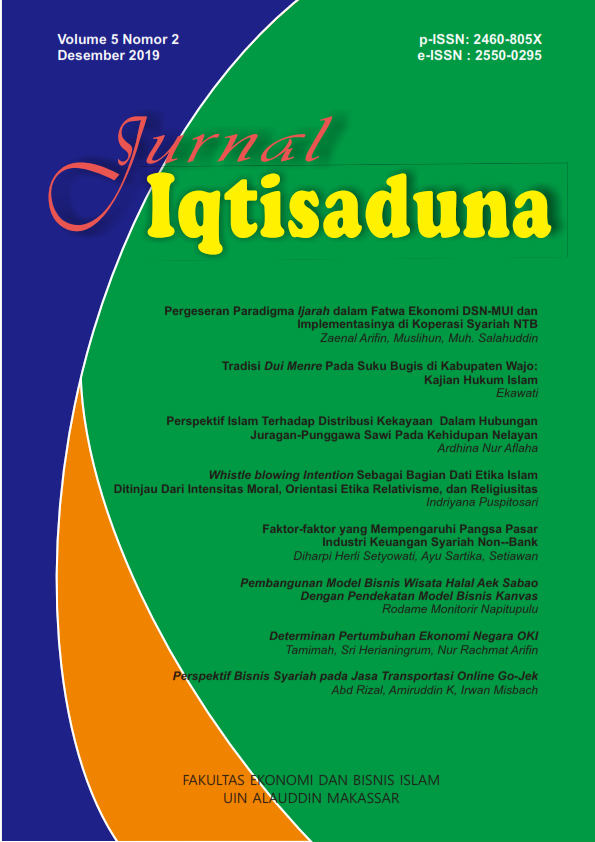WHITLEBLOWING INTENTION SEBAGAI BAGIAN DARI ETIKA ISLAM DITINJAU DARI INTENSITAS MORAL, ORIENTASI ETIKA RELATIVISME DAN RELIGIUSITAS
Abstract
Wrongdoing can occur in every organization. When an individual knows the wrongdoing, there is an option for the individual to leave it or report it. The individual's intention to report a wrongdoing can be influenced by factors related to themself, organization and environment.The purpose of this study is to examine the factors in their intention to report violations which consist of ethical orientation factors of relativism, moral intensity and religiosity. The object in this study is IAIN Surakarta Accounting students.The results of this study indicate that the variables of ethical orientation and religiousity have a significant influence on the intention to report wrongdoing. While the moral intensity variable does not affect the whistleblowing intentions.
Downloads
References
Abd. Samad, K., Khalid, H., & Kayadibi, S. (2015). Emerging Economies and Islamic Research Reducing Apathy in the Face of Corrupt Behaviour : Whistleblowing as an Act of ‘ Amr bi -l- ma ’ ruf wa - nahy ‘ an al -munkar. Journal of Emerging Economies and Islamic Research, 3(3), 1–14.
Abuznaid, S. A. (2009). Business ethics in Islam : the glaring gap in practice. International Journal of Islamic and Middle Eastern Finance and Management, 2(4), 278–288. https://doi.org/10.1108/17538390911006340
Ajzen, I. (1991). The Theory of Planned Behavior. Organizational Behavior and Human Decision Processes, 50, 179–211.
Barnett, T., Bass, K., & Brown, G. (1996). Religiosity , Ethical Ideology , and Intentions to Report a Peer ’ s Wrongdoing. Journal of Banking and Finance, 15, 1161–1174.
Belaja, K., Mohamed, I. S., & Othman, R. (2017). Factors Affecting Whistleblowing Intention in Account Departments of Malaysian Public Universities. Proceedings of Global Business and Social Science Research Conference, (February).
Brink, A. G., Cereola, S. J., & Menk, K. B. (2015). The Effects of Personality Traits , Ethical Position , and the Materiality of Fraudulent Reporting on Entry-level Employee Whistleblowing Decisions. 7(1), 180–211.
Cohen, J. R., Pant, L. W., & Sharp, D. J. (1998). The Effect of Gender and Academic Discipline Diversity on the Ethical Evaluations, Ethical Intentions and Ethical Orientation of Potential Public Accounting Results. Accounting Horizons, 12(3), 250–270.
Forsyth, D. R. (1980). A taxonomy of Ethical Ideologies. Journal of Personality and Social Psychology, 39(1), 175–184.
Hardi, Wiguna, M., Anita, R., & Zakaria, N. B. (2018). The effect of relativism ethical orientation , personal cost , and moral intensity on internal whistleblowing intention : the moderating role of organizational commitment. International Journal of Engineering & Technology, 7, 122–125.
Husniati, S., Hardi, & Wiguna, M. (2017). Faktor-faktor yang mempengaruhi intensi untuk melakukan Whistleblowing internal. JOM Fekon, 4(1).
Malik, M. (2018). Whistle-blowing as an Islamic Imperative: Empowering Muslim City Society towards Good Governance. Penang Institute Issues.
Near, J. P., & Miceli, M. P. (1985). Organizational Dissidence : The Case of Whistle-Blowing. Journal of Business Ethics1, 4, 1–16.
Nur, S. R. I. W., & Hamid, N. U. R. A. (2018). Professionalism and Moral Intensity of Auditors on Whistleblowing Intention on Makassar Public Accountant Office. International Journal Economics Management and Social Science, 1(3).
Othman, R., & Hariri, H. (2012). Conceptualizing Religiosity Influence on Whistle-Blowing Intentions. British Journal of Economics, Finance and Management Sciences, 6(October), 62–92.
Puni, A., Agyemang, C. B., & Asamoah, E. S. (2016). Religiosity , Job Status and Whistle-Blowing : Evidence from Micro-Finance Companies. International Journal of BUsiness and Social Research, 06(02), 38–47.
Putri, C. M. (2016). Pengaruh Jalur Pelaporan dan Tingkat Religiusitas terhadap Niat Seseorang Melakukan Whistleblowing. Jurnal Akuntansi &Investasi, 17(1). https://doi.org/10.18196/jai.2016.0043.
Qudus, A., & Fahm, A. O. (2018). The Policy of Whistleblowing in Nigeria : An Islamic Perspective. International Journal of Civic Engagement and Social Change, 5(3). https://doi.org/10.4018/IJCESC.2018070103
Schultz, J. J., Johnson, D. A., Morris, D., & Dyrnes, S. (1993). An Investigation of the Reporting of Questionable Acts in an International Setting. Journal of Accounting Research, 31, 75–103.
Setiawati, L. P., & Sari, M. M. R. (2016). Profesionalisme, Komitmen Organisasi, Intensitas Moral dan Tindakan akuntan melakukan Whistleblowing. E-Jurnal Akuntansi Universitas Udayana, 17(1), 257–282.
Shawver, T. (2011). The Effects of Moral Intensity and Whistleblowing Behaviors of Accounting Professionals. Journal of Forensic & Investigative Accounting, 3(2).
Sugianto, Habbe, A. H., & Tawakkal. (2011). Hubungan Orientasi Etika, Komitmen Profesional, Sensitivitas Etis dengan Whistleblowing perspektif Mahasiswa Akuntansi. Jurnal Universitas Hasanudin, 1–17.
Świątek-barylska, I., & Opara, M. (2016). Perception of whistleblowing by professionals-to-be. Management Forum, 4(3).
Valentine, S., & Godkin, L. (2019). Moral intensity , ethical decision making , and whistleblowing intention. Journal of Business Research, 98(January), 277–288. https://doi.org/10.1016/j.jbusres.2019.01.009
Wati, M., & Sudibyo, B. (2016). Pengaruh Pendidikan Etika Bisnis dan Religiusitas terhadap persepsi etis mahasiswa Akuntansi. Jurnal Economia2, 12(2), 183–201.
Zainudin, N. H., & Zahari, W. M. Z. W. (2018). Whistleblowing: A Western and Shari’ah Perspective. IIUM Law Journal, 26(1), 99–120.

